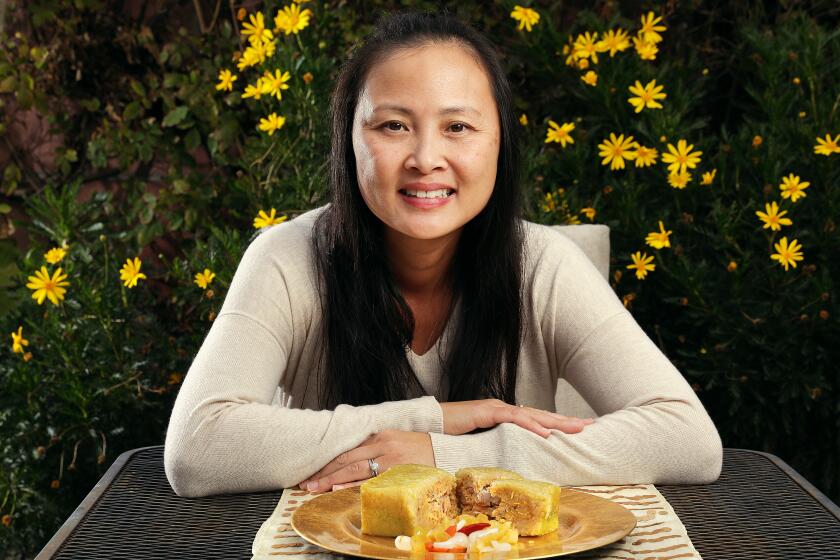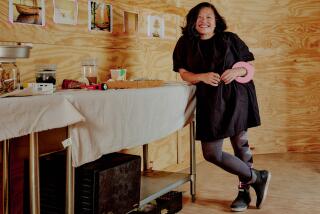Amid pandemic, Little Saigon restaurants keep cooking — for free — to nourish the needy
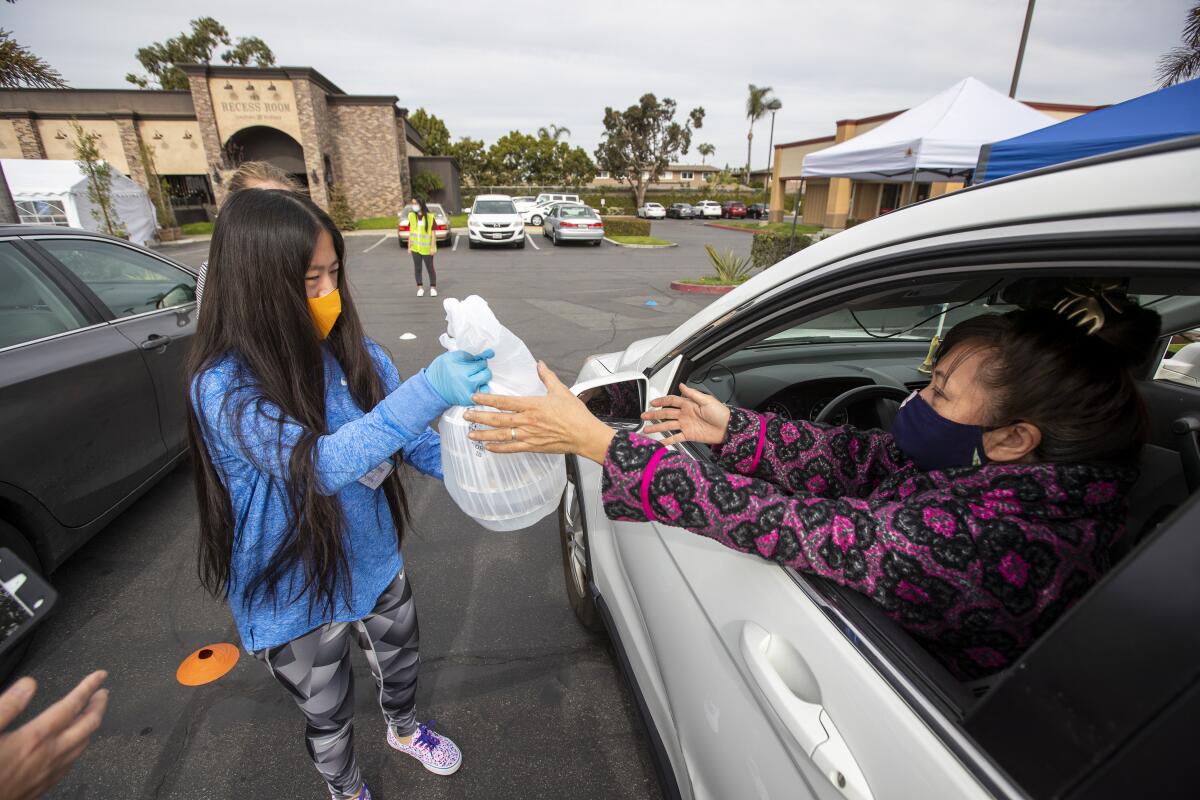
- Share via
The man in the beanie cap and frayed sweater rolled up in his late-model SUV, leaning out the window on the driver’s side.
“They told us to come here for the food. Is this the right place?” Tan Nguyen asked as he surveyed the high school volunteer handing out hot lunches at the Recess Room restaurant in Fountain Valley.
He and his wife, Susan Tran, live alone and are sheltering in Santa Ana. He’s 81, and Susan is 84. She’s fallen on her hip and has dizzy spells, so cooking is a challenge. But a westernized meal service isn’t an option for them. They said they don’t eat macaroni or cream of mushroom soup preserved with plenty of sodium.
Nguyen and Tran eyed the packaged meals — fragrant porridge and rotisserie chicken — with hope. A few minutes later, a student who had been serenading the seniors with her violin as they waited in the restaurant parking lot on a wintry Sunday placed some sealed containers in their hands. She talked to them about the food distribution schedule. Above their masks, the couple’s eyes imparted their thanks.
While seniors in Orange County’s Vietnamese communities can access donations from local food pantries, “it’s not the same taste. They are used to fresh, traditional cooking that just isn’t available with cans. This is the flavor of home,” said Danny Tran, owner of Son Fish Sauce, which has given five pallets of the condiment used in all manner of Vietnamese cooking to the Recess Room.
“We need to nourish our elders, especially at this time,” he said. “They are the ones whose sacrifices allow us to be here. They need to be healthy.”
While the coronavirus winds its way through Little Saigon and beyond, Vietnamese home cooking and monthly meal services are thriving.
These businesses and the people who run them are part of an informal network feeding a community during an unprecedented crisis; theirs are grassroots efforts that may not have attracted much attention. Here are some of their stories.
::
When would-be tourists research the history of the Orange County cultural district called Little Saigon, rising in the middle of once blooming citrus groves and strawberry fields, they probably aren’t encountering reports on the Recess Room, one of its newer hotspots. But in the shutdown sparked by COVID-19, the hip, Asian-infused eatery has transformed into the enclave’s “most generous” restaurant with charity operations managed “with the precision of an accountant,” according to locals on Facebook.
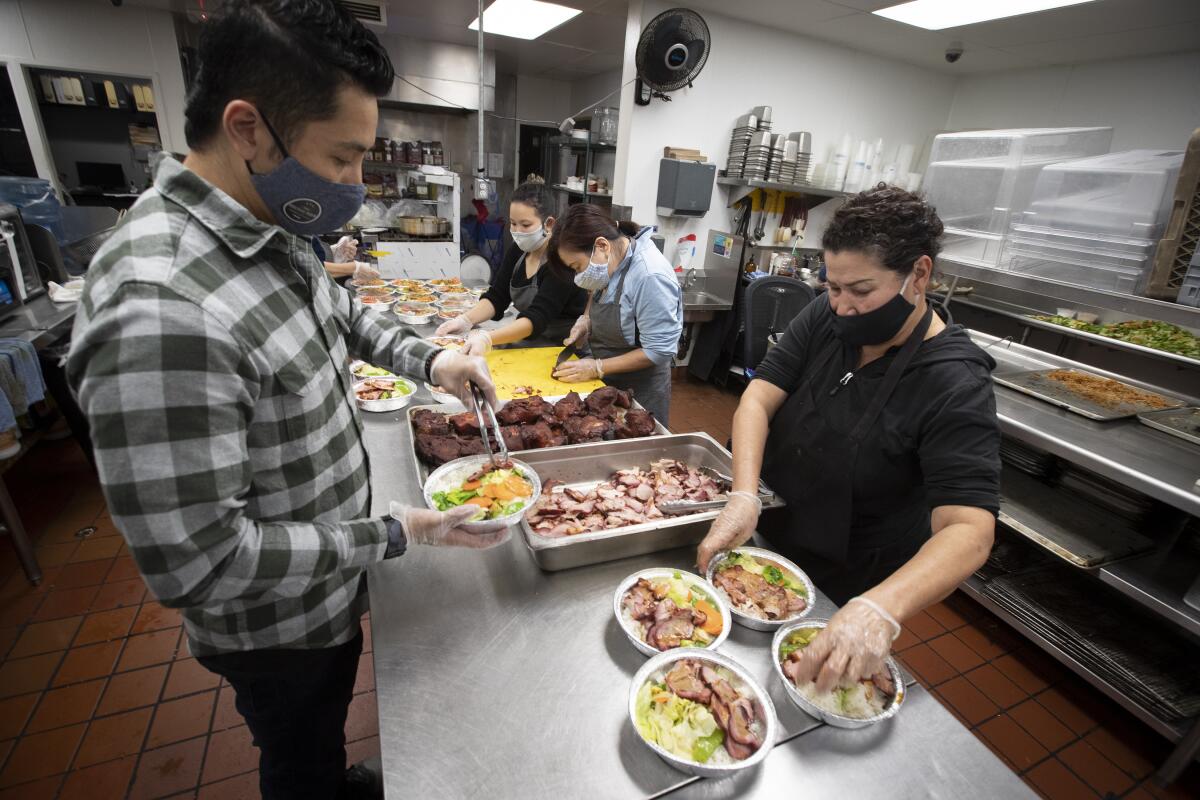
Every other Sunday, a group of young volunteers arrives by breakfast time. They handle prep work, installing pop-up canopies outside the former Coco’s, after owner Viet Pham, his mother and older sister have unloaded groceries and started rinsing, chopping, slicing, steaming and frying. The family buys 300 pounds of rice per week, on top of meat and produce and three cases of takeout bags.
“Any time you cook for 500 it’s intense. It takes eight to 10 hours, depending on how big your pots are,” Pham said.
His family has teamed with Moving Forward Together, a community coalition, combining their own funds with private donations from sources such as Sysco and Restaurant Depot, to offer nearly 60,000 free meals since the global pandemic began last March. The bill for each giveaway ranges from $5,000 to $6,000.
Organizers get the word out via social media or direct referrals. They try “never to turn people who really need it” away. In the meantime, the Recess Room has remained open for takeout and delivery.
“There’s no question we want to give back,” said Huong Pham, motioning to her brother while wiping her herb-flecked hands on a dish towel. “It’s the only thing we can do to feel better because otherwise, we feel so helpless.”
“We’re providing an opportunity for people to enjoy a restaurant-cooked meal,” Viet Pham added. “We make sure not to cut corners; we give something we would eat ourselves.”
::
Each month, hundreds of 5-liter jugs of umami-laced sauce make their way — for free — to area restaurants and low-income households. The donors are Danny Tran and his wife, Albee, cofounder and CEO, respectively, of Son Fish Sauce, which is produced on tiny Hon Son Island in the Gulf of Thailand and is a staple in all Vietnamese kitchens. (The company has 13 warehouses in the United States.)
Albee Tran happens to be the great-granddaughter of Khon Van Pham, a legendary fish sauce maker. And with all the daily stressors to stay nourished, the couple want to make sure that home cooks and chefs need not worry about supply.
“I tell people that you don’t have to use our product later on. We didn’t want this to be some type of ad. We saw that many minority communities are getting help by the government — but not the Bolsa [Avenue] community,” Danny Tran added, alluding to Little Saigon’s main thoroughfare. “We need to build ourselves up.”
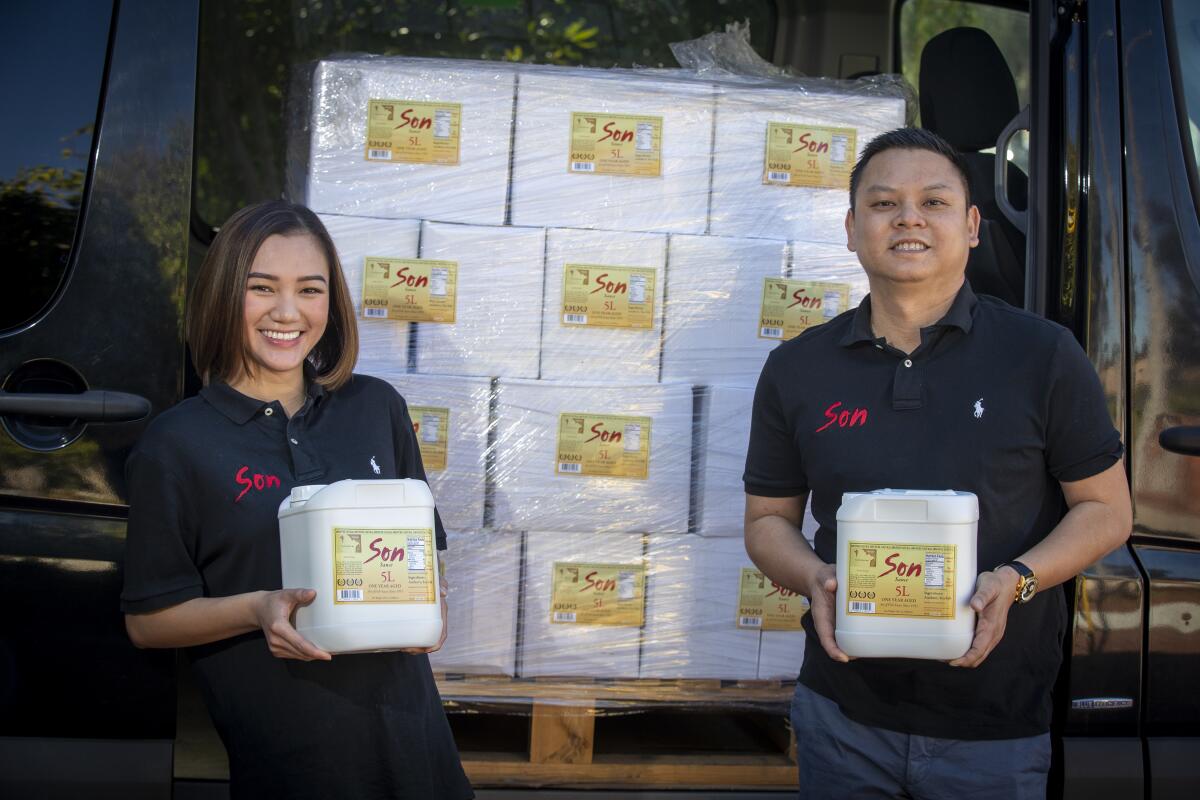
Once in a while, Tran squeezes in deliveries of donated masks along with the nuoc mam to aid people in “staying covered.” He also sponsors a Vietnamese home cooking group with nearly 10,000 members organized via social media. “When we get a call for goods, we always respond.”
“It’s a simple offering — and we are grateful,” said Hang Ngo, a grandmother of three who received 10 bottles to share with her sons in Midway City and Fullerton. “We cannot cook or dip anything we cook without this savory sauce.”
::
Uniting through the goodness of food reminds Thuy Vo Dang of Vietnamese refugees, new to the United States, who began forming mutual assistance associations in the 1970s and ‘80s to help with resettlement. The groups promoted family self-sufficiency along with empowering communities and “that spirit of mobilizing, stepping up for those who couldn’t navigate for themselves, that really emerged in this crisis moment,” said Dang, the curator of UCI’s Southeast Asian Archive.
She said she’s “not at all surprised that one of the more positive and heartwarming things to come out of the pandemic is this going all together. Language and culture have a way of bringing people to the table.”
Last spring, weeks after the World Health Organization deemed the outbreak of COVID-19 to be a pandemic, Sister Thuy Tran, a Catholic nun assigned to the mission integration department at Mission Hospital in Mission Viejo, began collecting dry goods. Rice. Ramen. Hand sanitizer. Seaweed. She knew the Vietnamese community needed to pay attention to its seniors because “clearly, they’re the most isolated, most vulnerable.” She sought reinforcement from her sister, the chef/owner of the acclaimed restaurant Garlic & Chives, with locations in Artesia and Garden Grove.
Kristin Nguyen leaped into action, spending many Thursdays in the restaurant kitchen stirring up hot meals with teriyaki salmon, garlicky rice and noodles, then portioning them for her sibling to pick up and deliver to residents of convalescent homes, along with first responders. She covered each week’s costs, about $10,000 through the months.
“Listen, these are the folks whose families can’t visit, not just for a short time but a long time. They have no connection to something familiar, and they need to eat healthy. We provided that,” Nguyen said, all the while offering Garlic & Chives takeout and struggling to keep her businesses and employees afloat.
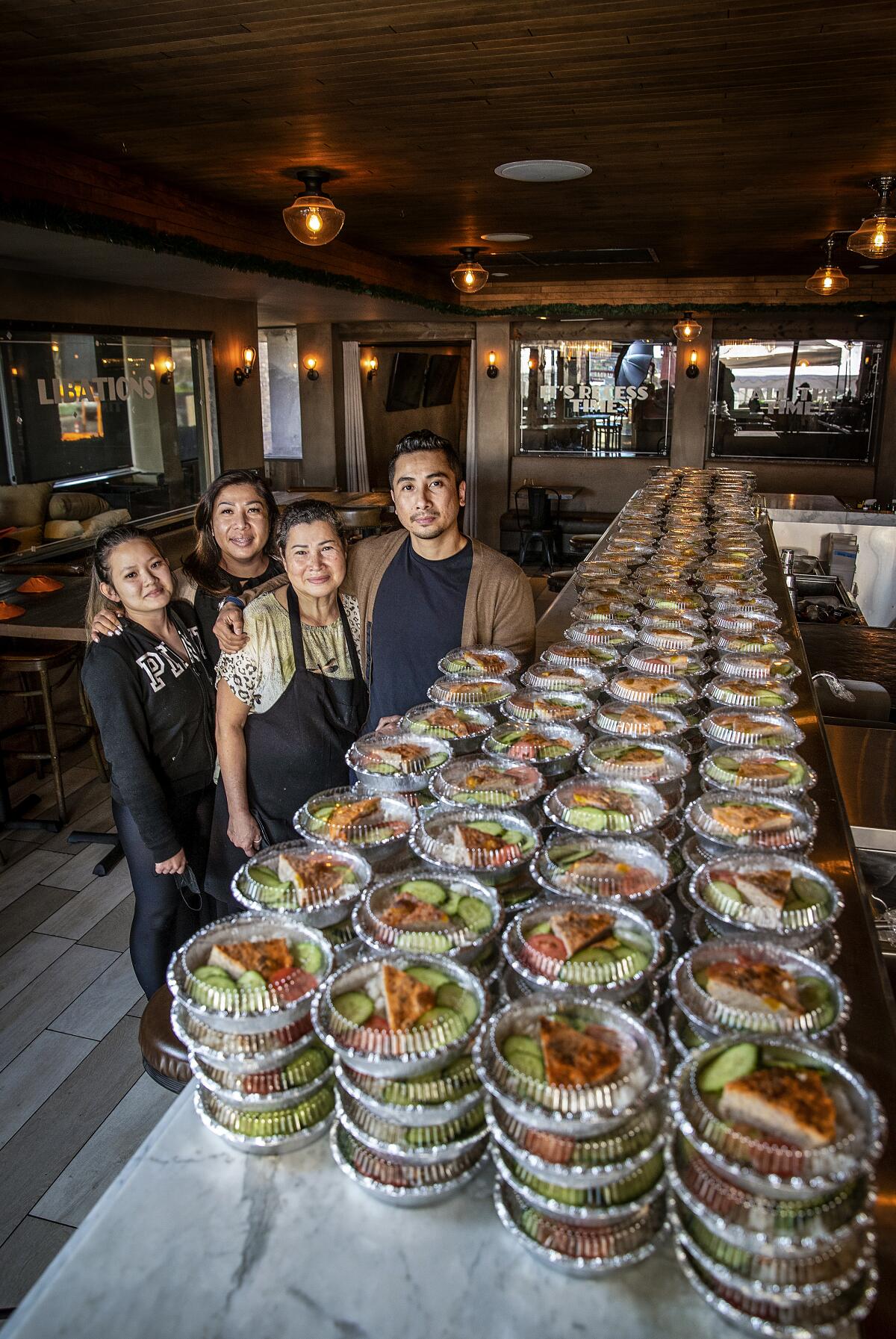
Later in the year, Tran and community activist Katie Nguyen Kalvoda, cofounders of the nonprofit Advance OC, helped to raise over $100,000 to dish up more than 4,000 meals delivered on two Saturdays during the holidays, with an assist from Garlic & Chives and 24 other restaurants, among them Little Saigon’s Song Long and Pholicious.
“This work really speaks to the power and passion of the people,” Tran said. “We had more than 900 — yes, 900 — volunteers sign up to deliver food. They’re so amazing.”
::
As Tan Nguyen drove away from the takeout lane at the Recess Room, Paul Hoang, a volunteer at the event, waved goodbye. It wasn’t his first experience with feeding the community. Almost a year ago, Hoang, a clinical social worker, opened his wallet to pay for broken rice and meat meals for up to 85 seniors who’d been left scrambling by the threat of the virus in Little Saigon.
In April, Hoang launched Moving Forward Together, a nonprofit spin-off of his consulting agency, Moving Forward Psychological Institute, Inc., in Fountain Valley, to help feed the needy and offer them social and mental health resources. “At different times, we get 5- or 6- or 700 people asking for help, and what are we supposed to do?” he asked. “I had to call in youth groups and activist groups and food providers to lend a hand. Some of them, we have never met, yet they immediately said yes. People’s wellness is at risk.”
Pham, the restaurateur, said he makes sure all volunteers, like Hoang, leave well-fed. The two men tapped on their phone calendars, quietly planning logistics for another weekend as the battered Hondas and minivans surged forward with passengers eager for sustenance.
More to Read
Eat your way across L.A.
Get our weekly Tasting Notes newsletter for reviews, news and more.
You may occasionally receive promotional content from the Los Angeles Times.

